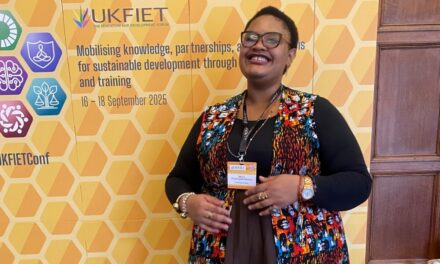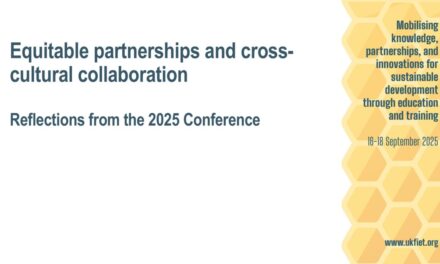Highlights from theme convenors of one of seven UKFIET 2025 conference themes, ‘Skills and knowledge for sustainable futures’: Amy Parker, Right to Play, and Karem Roitman, The Open University.
We have been delighted to receive a great quantity of high-quality proposals for this year’s UKFIET conference. Selection was hard and competitive because there were so many fascinating ideas being shared with us. We are now very much looking forward to a conference filled with outstanding papers, creative sessions and symposiums that will challenge us to rethink what knowledge, and skills need to be part of the education space into the future and how these can be most effectively taught.
To highlight a couple of exciting areas that will be discussed: AI and non-Western perspectives.
The quantum advancement of Artificial Intelligence is pushing us to rethink what education is, what it should focus on, and how it should take place. A session on ‘beyond ChatGPT’ will lead us in a critical exploration of AI’s potential and challenges through a creative session where participants will consider questions such as:
- How can AI best support the learner profile and be adapted for low-connectivity, low-resource contexts?
- How can AI help bridge learning gaps and prevent inequities?
- How can we equip stakeholders with the skills to use AI effectively?
- How can we ensure robust quality assurance mechanisms for these tools?
- How can governments, donors, and the private sector ensure ethical and responsible AI adoption?
A discussion of the eSchool 360 model implemented by Impact Network in collaboration with the Zambian government will move our discussion from possibilities to realities as we discuss what we learn about the implementation of technology-rich education. A paper on leveraging AI will expand our focus, taking us to a discussion of how AI-literacy can skill parents to become partners in their children’s education.
A key question as we move forward with technological education is how we can bridge the digital gap and ensure technology, and more specifically, AI, does not become a new tool of colonisation. Another creative session will address these questions, looking at learner agency, AI’s limitations, learning behaviour and cognitive multilingualism from a Global South perspective.
Keeping a critical global perspective in education is a big goal of the Knowledge and Skills stream, aiming to contextualise education, give voice to diverse users and providers, while keeping in mind global goals of justice and inclusion. Considering this, we are excited also to have several papers that highlight non-Western perspectives in education. A paper questioning the ‘learning crisis’ will look at Sahelian communities with strong traditions of Qur’anic schooling, where adult Ajami literacy rates can be as high as 70-80% including among women, highlighting that Ajami literacy has been given almost no attention among policymakers and education scholars. Another paper takes us to Nepal in their paper to explore how students and educators understand learning, challenging normative assumptions about education. A further session argues that Education in Emergencies can replicate colonial logic, undermining long-term critical learning.
We are truly excited also to have sessions that will bring discussions and debate on social and emotional learning, teacher training and development, play and project-based learning, foundational skills, and technical and vocational training in our schedule. We are only concerned that participants will not be able to attend all our sessions because of time limitations – this is when we wish everyone had a superpower enabling them to be in multiple places at the same time! We are looking forward to an unmissable conference.


